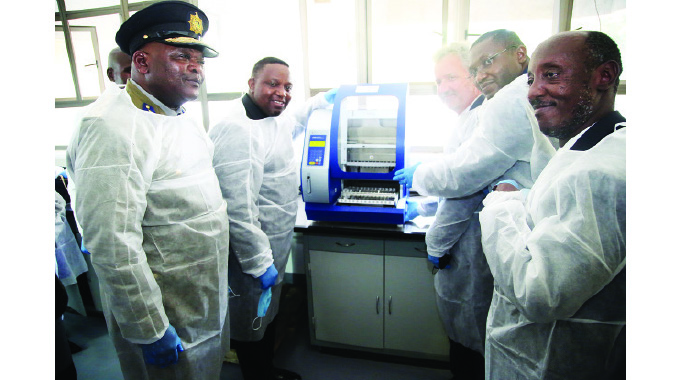Source: DNA equipment for GBV fight | The Herald
Talent Chimutambgi and Kudzaishe Muhamba
The Zimbabwe Republic Police has received deoxyribonucleic acid (DNA) analysis equipment worth US$327 294 and 85 480, which is expected to enhance criminal justice delivery system for survivors of gender-based violence.
The equipment, which was donated by the European Union (EU) in collaboration with the United Nations Children’s Fund (UNICEF) was part of the Spotlight Initiative, a global partnership aimed to eliminate all forms of violence against women and girls by 2030.
The development came as the country gears towards 16 days of gender activism.
Speaking during the handover ceremony held concurrently with the official launch of the forensic laboratory, Home Affairs and Cultural Heritage Minister Kazembe Kazembe said the development would capacitate the ZRP forensic department in bridging the gap between investigations and prosecution as well as eliminating sexual abuse against women.
“The use of forensics to solve the malady of crime in societies has become commonplace,” he said.
“As you may be aware, world over, the use of DNA analysis to solve crimes such as murder and rape, among others, is one area that has registered immense success,” said Minister Kazembe.
“Indeed, this will go a long way in elevating the Zimbabwe Republic Police’s capacity to solve crimes that require the use of DNA. I am grateful that this is in the spirit of the UNICEF mission statement which, among other things, seeks peace and social progress and mobilisation of resources to ensure that there is always a ‘first call for children’.”
Minister Kazembe said the country was lagging behind in terms of conducting DNA-related cases.
“DNA analysis was being subcontracted to private institutions whose charges were prohibitive,” he said.
“Resultantly, the capacity of the Zimbabwe Republic Police to utilise this potent contemporary tool faced a serious cost drawback.”
Minister Kazembe said the equipment would enable ZRP to deliver its mandate.
“Crime by its nature retards social development. Besides affecting children directly as victims, it also creates a corrupt society that is not conducive for the proper upbringing of children.
“UNICEF’s goals converge with the mandate of the ZRP which seeks to ensure peace, stability and a safe environment for all Zimbabweans, including children.”
Head of Governance for the EU Delegation to Zimbabwe Mr Patrick Lambrechts said the development would facilitate Zimbabwe to achieve the set Sustainable Development Goals (SDGs) in line with the gender parity dictates.
“Spotlight Initiative is one of the programmes that demonstrates the EU’s unwavering commitment to the achievement of the Sustainable Development Goals (SDGs), and particularly SDG 5, to achieve gender equality and empower all women and girls,” he said.
“Indeed, the Spotlight Initiative is playing a significant role in fighting against Sexual and Gender Based Violence.”
Acting UN resident coordinator Dr Alex Gasasira commended both Government and the EU for embracing the goal to mitigate violence against women.
“I commend the Government of Zimbabwe and the Ministry of Home Affairs for the continued strong commitment to our collective goal of elimination of all forms of violence against women and girls by 2030,” he said.
“I would like to take this opportunity to thank the European Union for investing in improving the lives of women, girls, men, and boys in Zimbabwe.”
UNICEF country representative Dr Tajudeen Oyewale said violence against women was a cause of concern.
“In Zimbabwe, the National Baseline Study on the Life Experiences of Adolescents conducted in 2010 indicates that 43 percent of adolescent girls aged between 13-17 years reported that their first incident of sexual intercourse was unwanted,” said Dr Oyewale.
“In the last two years, this situation has been exacerbated by the COVID-19 pandemic, leading to higher risk of intimate partner and domestic violence, including sexual violence and child marriages.”
Police Commissioner-General Godwin Matanga said they were determined to leave no stone unturned in accounting for perpetrators of crime and bring criminal elements to justice with irrefutable evidence.
Newer Post
Faulty units back up, stabilise power supply 
COMMENTS